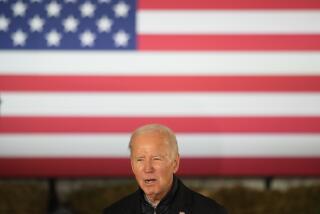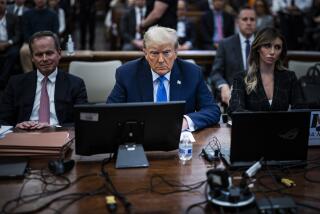Analysis: Trump embraces the blame game, while brushing aside some inconvenient realities
President Trump’s frustration has repeatedly been visible as his successful campaign has given way to a troubled presidency, driven by the distance between his promises and the bracing difficulty of governing.
At a campaign rally Wednesday in Nashville and in a separate Fox News interview, Trump had two opportunities to encourage Americans to move toward his plans on issues like healthcare. Instead, he continued to lean on campaign bravado and deflect responsibility.
He blamed his lawyers’ advice for the repeatedly stalled effort to enact a travel ban that most dramatically affects Muslims. He blamed Democrats for the difficulties facing healthcare legislation, even though his most urgent current problems lie among his fellow Republicans. He complained that he’d been forced to take on healthcare when he really wanted to focus on tax reform — as if he hadn’t included, in every campaign speech, his vow to repeal President Obama’s healthcare plan on day one.
Trump’s credibility has long rested on the notion of winning — over and over. He told his campaign audiences that when he was president they would win so much they’d be sick and tired of winning. So far, polls continue to show that he gets strong marks for keeping his promises. But he’s not winning some big battles now, and the tension shows.
The week has brought a number of examples.
On Capitol Hill on Wednesday, one of Trump’s most loyal defenders, Rep. Devin Nunes, a Republican from Tulare, broke with the president by acknowledging there is no evidence to support Trump’s claim that Obama wiretapped him at Trump Tower.
A poll by the president’s favorite television network, Fox News, found him less popular than two entities Trump routinely mocks and wants to dismantle, Planned Parenthood and Obamacare.
A federal judge in Hawaii halted Trump’s revised travel ban hours before it was to take effect. Then another federal judge in Maryland weighed in with a similar ruling.
Both judges cited Trump’s own statements as problematic, saying that then-candidate Trump’s public embrace of a “Muslim ban” provided evidence that his travel order might be improperly intended to discriminate on the basis of religion.
Little more than an hour after the first judge’s decision, Trump arrived onstage at a Nashville rally that looked just like the events he held when he was steamrolling over his primary challengers. Missing was any concession to the new realities he faces having graduated from candidate to president.
Indeed, he almost willfully seemed to make his administration’s legal situation worse, blaming his lawyers for making him sign off on the revised version of the travel order.
“I wasn’t thrilled, but the lawyers all said ‘Let’s tailor it.’ This is a watered-down version of the first one,” he said. “I think we ought to go back to the first one and go all the way, which is what I wanted to do in the first place.”
In his eight weeks in office, Trump has accomplished some of what he promised. He’s started to erase regulations that he says stifle the economy. His Supreme Court pick, Neil Gorsuch, seems destined for confirmation. Changes in the tax code long sought by Republicans are still on the list for later this year.
But Trump’s presidency has stumbled on several fronts because it’s just not as easy to be president as Trump spent the last 21 months contending it was.
The eye-opening comment he made last month about his efforts to replace Obamacare — “Nobody knew that healthcare could be so complicated” — can serve as a mantra on many fronts.
The upside of Trump’s political positioning as a blunt outsider ignoring political niceties has become a downside for his presidency. In the campaign, he could — and did — try to be many things to many people. He pledged to expand the military as never before, provide Americans with healthcare that was both cheaper and better than Obamacare, stop profligate spending even as he protected and expanded giant benefit programs like Social Security, Medicare and Medicaid.
There was very little talk of trade-offs or tough choices.
In the budget released Thursday, Trump made good on his promise to request a military buildup. But the costs, Americans are about to find out, will come in funding for much they’ve come to expect from government — something Trump never explained as he campaigned.
The limitations of Trump’s approach are evident in the healthcare battle.
Despite his vows, the GOP plan breaks two of his promises up front: it would be far more expensive than Obamacare for many Americans and would cut back on Medicaid spending. On Monday, the analysis from the nonpartisan Congressional Budget Office found that, compared with Obamacare, 14 million fewer Americans would be insured within a year, and 24 million over 10 years. That would break Trump’s vow to cover everyone.
But the president has done little to calm either fearful citizens or legislators leery of walking the plank. His plan, he said in Nashville, would repeal Obamacare “and make healthcare better for you and for your family.” None of that explained how some Americans — particularly the older and poorer ones who formed the base of his support — would be able to afford it.
He suggested that he and legislators would negotiate away their differences — “We’re going to all get together,” he said — but gave no further details. He said he would work to bring down the cost of prescription drugs by having the government negotiate prices, but gave no indication how he’d convince his fellow Republicans to reverse their longstanding refusal to consider such an effort.
Even as Trump continues to avoid acknowledging the trade-offs his policies call for — let alone explaining and asking the public to get behind them — he continues to create distractions from his message.
As a candidate, particularly one with few specific plans for opponents to pick apart, that approach rarely seemed to impede him. It is doing so now, and sometimes glaringly.
That’s been the case with a third issue hobbling his presidency, his public accusation that President Obama wiretapped him in Trump Tower.
The charge came in multiple tweets early on a Saturday morning; it was not until a day later, in what seemed an attempt to dump the mess into someone else’s lap, that the White House asked Congress to investigate the allegation.
Trump’s inability to put up any evidence, even to Republicans, has driven even some loyalists to the breaking point, as Nunes showed Wednesday.
In his Wednesday interview with Trump, Fox News host Tucker Carlson returned time and again to Trump’s own behavior and its potential to undermine the president’s credibility, precisely when he needs to convince Americans to support his plans.
“Why not wait to tweet about it until you can prove it?” he asked. “Don’t you devalue your words when you can’t provide evidence?”
Trump seemed not to have a direct answer.
Twitter: @cathleendecker
ALSO:
Trump vows to appeal ruling against revised travel ban—or resurrect the first ban
Updates on California politics
Live coverage of the Trump transition
More to Read
Get the L.A. Times Politics newsletter
Deeply reported insights into legislation, politics and policy from Sacramento, Washington and beyond. In your inbox three times per week.
You may occasionally receive promotional content from the Los Angeles Times.







